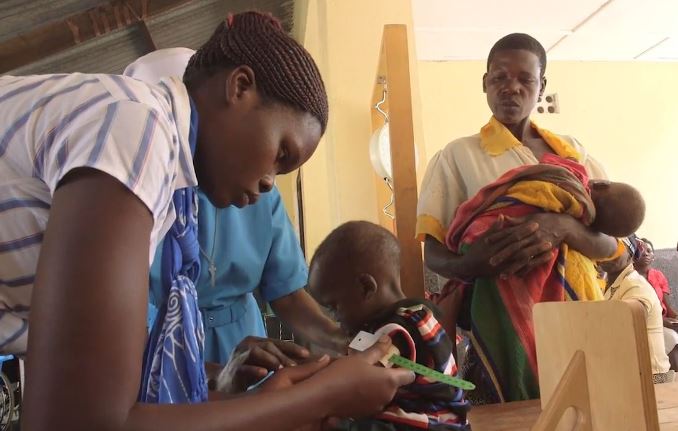
Strengthening health systems to tackle malnourishment in Uganda

Context
Undernutrition and HIV are the two main drivers of increased morbidity and mortality in children under age 5 in Sub-Saharan Africa. In Uganda, 4 per cent of children under age 5 suffer from moderate acute malnourishment and 1 per cent are diagnosed with severe acute malnourishment. Areas experiencing humanitarian conflicts or receiving an influx of refugees face additional challenges in tackling malnourishment.
Uganda’s West Nile Region, specifically the Arua district, hosts large numbers of refugees fleeing civil wars in the bordering countries. The region also has Uganda’s highest prevalence of moderate acute malnourishment and severe acute malnourishment amongst children under age 5, at 10.4 per cent and 5.6 per cent, respectively.
To tackle this issue, the Ministry of Health developed national guidelines for integrated management of acute malnutrition in 2006 and updated them in 2016. The 2016 integrated management of acute malnutrition guidelines suggest supportive supervision amongst health workers as one of the tools for improving quality of care. However, there was no robust study on the effectiveness of supportive supervision in improving health outcomes of children with malnourishment.
Researchers at the World Health Organization CUAMM jointly conducted the evaluation to test whether supportive supervision could improve outcomes of outpatient malnourished children. The first phase provided supportive supervision to health centre staff, and the second phase provided supportive supervision to community health workers. The evaluation also looked at whether supportive supervision improved the overall quality of care, quality of data and access to care. Three out of six health centres with heavy footfall were randomised to receive the intervention, with others serving as the comparison group.
Evidence
The evaluation demonstrated that the supportive supervision intervention was a cost-effective measure to improve the quality of nutrition care, health outcomes, data quality and access to care for outpatient malnourished children in a resource-constrained humanitarian setting.
Findings showed the health centres that received enhanced nutritional supportive supervision had significantly higher cure rates than those that operated as usual. The defaulting rate – the rate at which children dropped out from treatment – was also significantly lower in the intervention centres than in the comparison-group facilities that did not receive supportive supervision.
Additionally, after the extension of supportive supervision to community health workers, the total number of children enrolled in the intervention centres increased by a significant 38.6 per cent when compared to the centres that did not get supportive supervision.
Evidence impacts
Type of impact: Improve the culture of evidence use
When decision makers or implementers demonstrate positive attitudinal changes towards evidence use or towards information the research team provides. Examples include strengthening monitoring and evaluation systems, increasing understanding of evidence and openness to using it, integrating these systems more firmly into programming or commissioning another evaluation or review.
This is one of 3ie’s seven types of evidence use. Impact types are based on what we find in the monitoring data for an evaluation or review. Due to the nature of evidence-informed decision-making and action, 3ie looks for verifiable contributions that our evidence makes, not attribution.
Read our complete evidence impact typology and verification approach here.
Close windowImpact evaluation findings led the Ministry of Health to improve its monitoring, support and supervision of health workers who tackle malnourishment in conflict-prone regions of Uganda. Intense advocacy and timely dissemination of the study results at a time when the health ministry was in the process of reviewing the health unit monthly report led the ministry to include new supportive supervision indicators in the report submitted on a monthly basis by the local health facilities. Additionally, the ministry added a new section to the report to assess the nutrition status of outpatients served by the units.
Suggested citation
International Initiative for Impact Evaluation (3ie), 2020. Strengthening health systems to tackle malnourishment in Uganda [online summary], Evidence Impact Summaries. New Delhi: 3ie.
Evidence impact summaries aim to demonstrate and encourage the use of evidence to inform programming and policymaking. These reflect the information available to 3ie at the time of posting. Since several factors influence policymaking, the summaries highlight contributions of evidence rather than endorsing a policy or decision or claiming that it can be attributed solely to evidence. If you have any suggestions or updates to improve this summary, please write to influence@3ieimpact.org